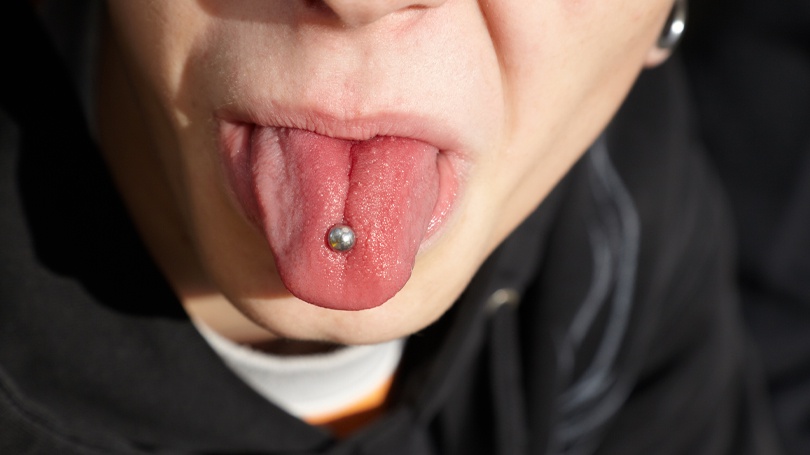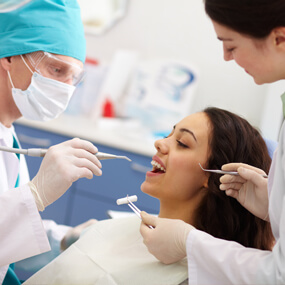The Risks Associated With Oral Piercings

Lip and tongue piercings are a form of expression but potentially dangerous. A recent study revealed that tongue piercings are now the second most common piercings among women aged 18-25 and quite popular with young men as well. Such piercings are not new. Many cultures have embraced body modifications like these for tradition and fashion, but oral piercings in particular present considerable risk.
Here are the potential complications to consider:
- Prolonged bleeding—According to a study in the International Journal of Medical Sciences, as many as 96 percent of people who get oral piercings complain of bleeding 12 hours after the procedure. This happens when blood vessels are punctured and may require medical treatment and antibiotics.
- Excessive drooling—The jewelry in your mouth will stimulate saliva production and can actually affect how you perceive food and drink. In most cases, the unwanted drooling is temporary, but when the drooling and taste change becomes permanent, removal of the piercing may be the only remedy.
- Nerve damage—You will most certainly experience some nerve damage when you get an oral piercing. This leads to swelling, which in some cases is severe enough to obstruct the airway. Temporary numbness is common. In some cases, numbness, as well as alteration of taste, is permanent.
- Infection—An oral piercing inherently creates a wound. That wound is susceptible to the bacteria found in the mouth, and you introduce even more bacteria by handling the jewelry. For this reason, pain and swelling are all but guaranteed early on, and infections can be severe enough to be life-threatening.
- Transmission diseases—People transmit infectious diseases between each other and often through direct contact, such as kissing. An oral piercing puts you at a much greater risk of acquiring such diseases and is deemed a risk factor for herpes, various hepatitis types, and even AIDS.
- Endocarditis—The wound created for an oral piercing can allow bacteria from the mouth to enter the bloodstream. That bacteria can travel all the way to your heart and cause endocarditis, which is inflammation of the heart valves or heart tissue.
- Dental damage—The jewelry in your mouth will likely come in contact with your teeth at times. When it does, particularly when jarred, it can chip or crack your teeth. It can also cut your gums as well as damage fillings, crowns, veneers, and so forth. In fact, a recent study in a dental journal found that nearly half of all people with an oral piercing experienced a chipped tooth within four years.
- Tearing accidents—Another concern is the risk of tearing. Unwanted removal due to an accident can lead to tearing of the tongue and lips, which can have permanent ramifications in some cases.
- Gum disease—People with oral piercings are at greater risk of gum disease, and the risk factor is increased with certain types of jewelry, such as long-stem barbells. This happens because the jewelry comes in contact with the gums, causes tissue damage, and can trigger your gums to recede.
- Routine oral functions—An oral piercing transforms your mouth. It can result in a speech impediment and make it difficult to chew and swallow. As mentioned, taste can be altered, and you can experience excess saliva. It can also interfere with dental care at home and at your dentist’s office.
- Metal allergies—Hypersensitivity to metals is quite common and can lead to many complications ranging from minor to severe. You should consider having yourself tested prior to a piercing.
- Jewelry aspiration—When you chew or have an accident, your jewelry is at risk of loosening. Once loose, it is a choking hazard, and if you swallow it, it can damage your lungs or digestive tract.
Oral Piercing Removal
You can remove an oral piercing, and in some cases, such as getting a dental X-ray, it may be necessary. Even with long-term removal, however, there is no guarantee that the wound will heal. It varies from person to person. If you are unfortunate and the wound does not heal, you will forever be susceptible to infections, viruses, diseases, and so forth due to the bacteria in your mouth. In addition, you may have to deal with ongoing irritation when chewing, drinking, brushing your teeth, rinsing, and so on.
Your Oral Health
Oral piercings are a personal choice, but ask any dentist or dental hygienist, and they will generally advise you against them. The risks are not worth it, and there are other ways that people can express themselves without the potential for health complications. It is unfortunate that many young people make this choice without fully appreciating the potential long-term consequences. If you are contemplating getting an oral piercing or already have one, consider discussing it with your dentist.




